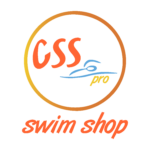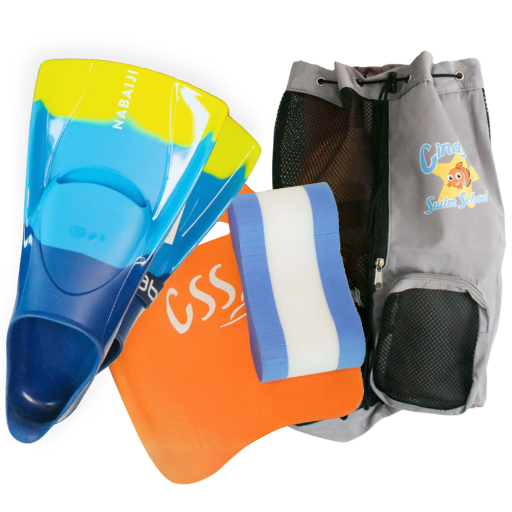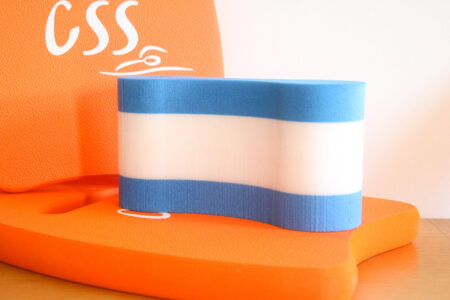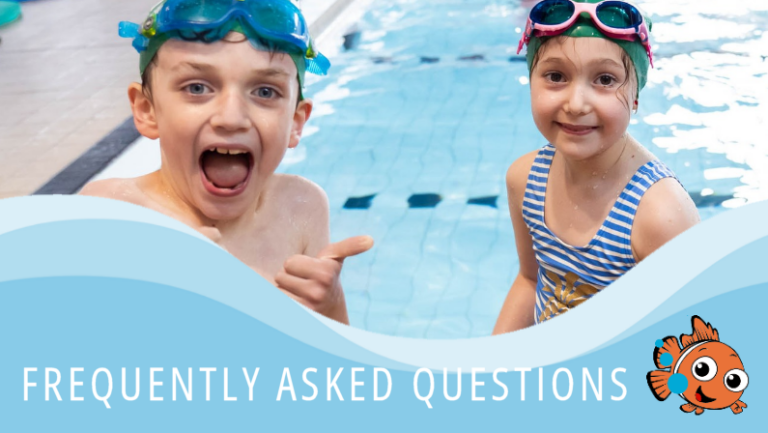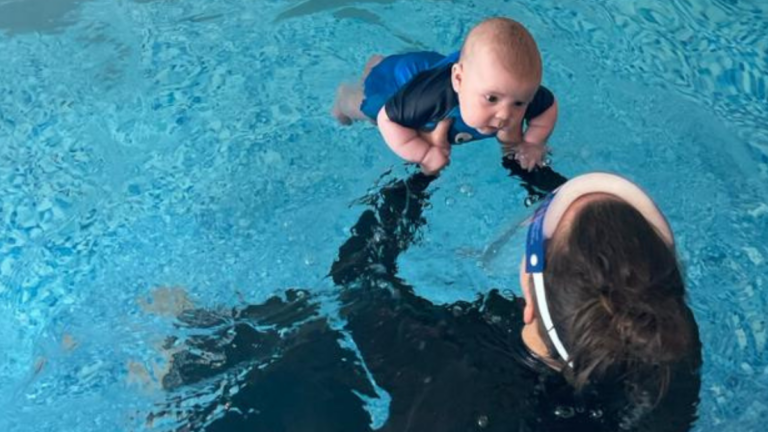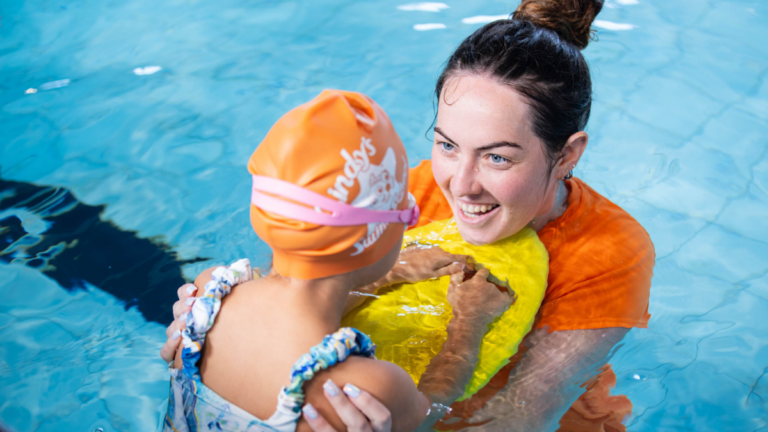Learn to Swim as an Adult: What You Need to Know
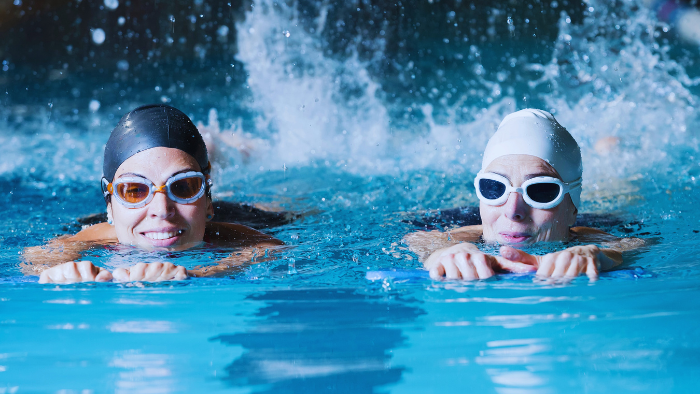
If you’re an adult who’s never learned to swim you’re not alone! Whether you are 30, 40 or 50 years old, or even in your 80s, it’s never too late to learn!
Many adults avoid pools, beaches and holidays for years because of fear, embarrassment, or a bad past experience, but if you’re sick of missing out on the fun and you want to give swimming a go, you’ve come to the right place! At Cindy’s we love teaching adults how to swim!
What’s important to know is this: learning to swim as an adult is not only possible it can be life-changing.
Coming from South Africa, my childhood and adult years were filled with endless ways to enjoy swimming – activities like surfing, wakeboarding and snorkeling (as well as just swimming!) The joy that comes from swimming is hard to explain and I’m passionate about teaching adults how to swim so they can experience this too.
Frequently Asked Questions about Adult Swimming
Click the question to jump to our answer!
- Why learn to swim as an adult?
- Is it too late to learn how to swim as an adult?
- Can you teach yourself to swim as an adult?
- What if I’m overweight? Can you be too big to learn how to swim?
- How easy or difficult will learning how to swim be?
- How long does it take to learn how to swim for adults?
- What equipment do I need and what should I wear?
- What should I expect at my first swimming lesson?
- What if I panic during a lesson?
Why Learn How to Swim As An Adult?
Swimming is healing, relaxing and fun! It’s good for you physically, mentally, and emotionally. And it isn’t just me who thinks that swimming is great! There is an abundance of research that proves the multiple and vast benefits of regular swimming.
For example, research from the Value of Swimming report commissioned by Swim England reported that:
1.4 million adults say that swimming has significantly improved their depression and anxiety symptoms. In addition, swimming helped prevent 78,500 cases of ill health in a single year including dementia, diabetes and strokes.
If you’re convinced by the data but still have questions, read on for everything you need to know.
Is it too late to learn how to swim as an adult?
Never! The oldest person I have taught to swim was a lovely lady who was 87 years old. Throughout her life she had never been taught how to swim. Her husband, a keen swimmer, loved all things water and ensured their children learned how to swim too. This left Mum sitting on the beach or by the poolside, watching them have fun for many years. On her 87th birthday she decided that she was going to learn how to swim before she died and so our journey began.
It was an amazing time because I taught her how to swim a confident, solid front crawl (freestyle) and backstroke in just two weeks! This lady was a natural swimmer!
How this made her feel, you can imagine. She was so proud to be swimming at last, but also regretful that she had waited so long. I’m sure her advice would now to be grab the chance and learn while you can!
Not every swimmer’s journey will be as smooth or easy or fast. But, it doesn’t make it any less worthy! Rest assured, swimming is not as difficult as you may think.
All the different strokes; front crawl (freestyle), backstroke, breaststroke and butterfly, are built on a solid, but basic foundation of a few skills that, once mastered, makes learning much easier. At Cindy’s we aim to give our swimmers the best swimming experience possible. We have created an easy to follow teaching programme, taught by passionate, caring teachers whose goal is to help their students become happy and confident swimmers. Our teachers are trained and qualified to teach all body types and abilities.
Can you teach yourself to swim as an adult?
There’s no shortage of videos, apps and articles online, and these can be useful for getting a basic understanding of swimming or feeling more prepared before you start.
That said, learning to swim on your own can be hard, especially if you’re nervous or unsure in the water. Online resources can’t see what you’re doing, keep you safe, or step in if you feel anxious or overwhelmed.
A good swimming teacher offers calm reassurance, real-time feedback and support that’s tailored to you. They help you build confidence, avoid bad habits, and progress at a pace that feels comfortable, which is why most adults find lessons the quickest and most enjoyable way to learn.
What If I’m Overweight? Can you be too big to learn how to swim?
Don’t worry about being too big, water is wonderfully buoyant. Water supports bodies of all shapes and sizes. In fact, many larger adults find floating easier than they expect.
The largest person I ever taught was 6 foot 4 and weighed 120 kg and was absolutely terrified of water! He had never walked into a swimming pool before and felt unstable on his feet. He instinctively grabbed me and threw himself around me like a teddy bear. Thanks to the buoyancy of water, I managed to hold him and show him that he was perfectly safe. From that first lesson, we built a strong, solid foundation of understanding how water works and how his body fitted in that space. Within a few months he could happily swim a few basic strokes.
How easy or difficult will learning how to swim be?
This is a hard question to answer; learning is individual and where you come from, your understanding of water and if you have had anything like a near drowning experience, will affect how you learn to swim.
What I can say is, swimming itself isn’t overly complicated. The basic foundations of swimming are essential to being able to swim properly and to being able to enjoy it. Once you have learnt those as a swimmer, the rest is much easier.
If you have had negative experiences around water, then please do share that with your teacher. You will be helping them to support you, so that you can feel more safe and confident.
Aside from how difficult or easy learning to swim may be for you, you should be prepared to invest in several weeks of lessons at least. Some people take weeks to learn to swim, other people take months before they reach the competency they want to achieve.
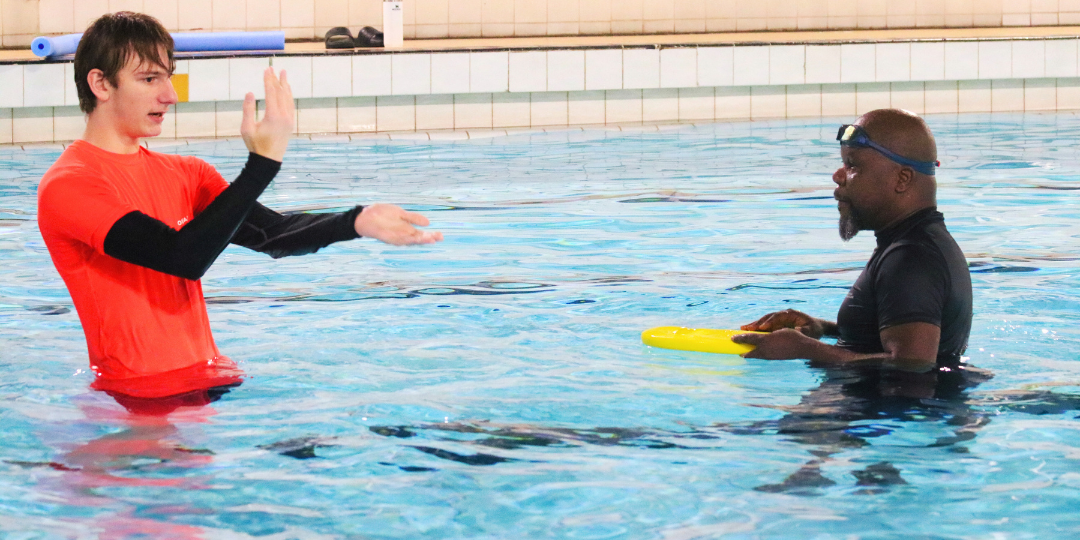
how long does it take to learn how to swim for adults?
How long it takes to learn to swim as an adult varies from person to person. It depends on factors such as your confidence in the water, any previous experiences (positive or negative), how often you attend lessons, and what your personal goals are.
In general, most adults should be prepared to commit to at least several weeks of lessons. Some people feel comfortable floating, breathing and swimming short distances within a few weeks, while others take a few months to build the level of confidence and technique they’re aiming for. Both are completely normal.
Learning to swim isn’t a race. Progress often comes in small but meaningful steps, feeling calmer in the water, learning to breathe comfortably, or trusting your body to float. With regular practice, patience and supportive instruction, those steps gradually come together to form confident, relaxed swimming.
What equipment do I need and what should I wear?
What you need for swimming lessons may vary depending on the swim school you go to, but these are what we think are essential:
- A swimming costume: Make sure that the swimming costume is comfortable and stretchy, especially for mens’ shorts. Men’s swimming trunks should allow free movement and the ability to climb in and out of swimming pools without restriction. If swimwear is too loose it can drag and make the swimmer feel heavy. Loose swimwear may also get in the way of being able to swim properly.
- A good swimming cap and goggles: If you want to swim properly, the reality is that your face will need to be in the water for a period of time. Goggles which are comfortable to allow you to see where you are going are essential. A swimming cap keeps the goggles in place, keeps your hair dry, and helps with streamlining. We sell ones we recommend because we know they work, but we are also happy to recommend others
Zoggs Predator Goggles

£25.00
What to Expect at your First Swimming Lesson?
At the start of your first swimming lesson, I recommend a quick chat with your swimming teacher. Fill them in on your swimming background and any experiences, such as near-drowning incidents. This is also a good opportunity to communicate your goals for the lessons, helping your teacher guide you over the sessions to achieve them.
Your teacher in turn will inform you on what to expect from your first swimming lesson and going forward.
Once you are in the pool, your teacher will teach you the most important rule of swimming: breathing. Proper breathing is essential to being able to swim properly and enjoying the process. Your teacher will also introduce the basics of kicking and floating on your front and on your back.
Our teachers are in the pool and they hold swimmers to give as much support as needed, especially whilst swimmers are finding their swimming tails and building confidence in those first few lessons.
What if I panic during a lesson?
Panic is more common than people realise, and it’s nothing to be embarrassed about. Our teachers are trained to recognise signs of anxiety and will always prioritise your safety and comfort. You’re never forced to do anything you’re not ready for, and progress is always made step by step.
The Next Step…
Learning to swim as an adult can seem daunting , but please don’t let nerves or fear stop you. Learning to swim as adult is one of the most joyous achievements and you will NEVER regret it. We would love to welcome you to a swimming class at any time. You can read more about our adult swimming lessons at Cindy’s here.. Please get in touch with any questions you may have or a book a lesson today and get started on your swimming journey!

